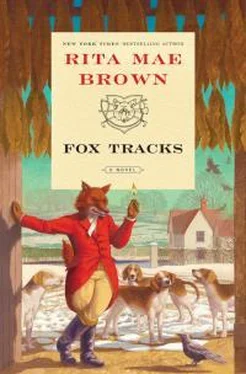“What the hell?” Shaker was dumbfounded.
“Crawford says he’ll do all that, but only if Old Paradise will no longer allow us to hunt their place. He wants all the rights to hunt there.”
“He can’t do that.” Shaker exploded. “He’s an outlaw pack and the DuCharmes know it.”
“Yes, they do know it, but there’s nothing the Masters of Foxhounds Association can do to landowners. Their only weapon is to deny anyone who hunts with an outlaw pack the ability to hunt with a recognized pack. Crawford couldn’t give a shit. No one hunts with him anyway, unless they work for him. Damn. This is my fault. I should have kept my mouth shut at the Ball.”
“Perhaps,” Betty said, not lying to her. “But Crawford has been laying for us for some time. The only thing I can think of is that you and Walter”—she said—“pay the DuCharmes a visit.”
Sister placed her hands on the table palms down, then folded them in her lap. “We will, and you know what we’ll have to say? That we understand. No hard feelings. They haven’t got a pot to piss in. Those two brothers have been fighting about that property for decades. The result is nothing gets done, especially to the main house. There is no way we can solve this problem. We haven’t the funds to make those repairs, to replace their fences. Also, if we did it for them, we’d have to do it for every fixture we are allowed to hunt. We’d be bankrupt in a skinny minute.”
The land on which a hunt is allowed for their sport is called a fixture.
“Plus it violates a central tenet of hunting,” Betty coolly added.
Shaker nodded, his dark red, closely cropped hair reflecting the kitchen light. “Funny, isn’t it? When the Masters of Foxhounds Association came into being in 1907, one of the rules they formulated was that no hunt pay for the use of territory. The land must be freely given to hunt over. Those men knew what they were about.”
“Yes, they did, and they were all men of great wealth,” Sister agreed. “They knew if a master could pay, then any poor hunt, even a farmer pack, would be out of business. It was a most farsighted idea.”
“What does Crawford think he can do?” As upset as Shaker was, he could still eat, and he reached for more spoon bread. “He can’t ride but so much. He can’t hunt his own hounds and he can’t hire a good huntsman because no one wants to be tainted by his brush. Who would hire them if and when they left Crawford?”
“Money,” said Betty. “He’ll throw so much money at someone that he’ll get a decent huntsman. Maybe even a good one.”
A long silence followed, then Sister said what the other two had been thinking. “We need to go through our landowners. Let’s determine who is solid and who is having financial problems. We’d better get to them before Crawford does.”
“Janie,” Betty called her by her Christian name, “we still can’t pay them.”
“No, we can’t, but we can appeal to their sense of fairness, and we might be able to offer labor. There’s no reason we can’t rouse our club members. We go to these fixtures to clear paths and build jumps. There is no stricture from our national organization that prevents us from offering services.”
“Like what?” Shaker said, knowing he’d be on the chain gang.
“They will have to tell us,” said Sister.
CHAPTER 9
After Shaker and Betty left, Sister checked the big old wall clock. It was two-thirty. Walter Lungrun, her joint-master, was a physician. No matter how bad the roads, he made it every workday to the hospital using his teeth-rattling Wrangler. The Jeep could go through most anything, plus it looked so cool that Sister broke down last summer and bought one herself, black with a gold pinstripe.
The major roads would be cleared and by now most of the secondary roads as well. But as the sun’s rays, long and low, finally set, the roads would turn to ice.
She’d call Walter later, once he returned home from the hospital. Throwing on the old flight jacket, earmuffs, gloves, and her wonderful cashmere scarf—which really kept her neck warm—she opened the mudroom door, inhaled deeply, feeling the cold air fill her lungs.
While many household chores awaited her, she preferred outside ones. A disciplined woman, Sister would return later to the dreary repetitive round of cleaning house, washing floors, and organizing papers.
Raleigh and Rooster came out the dog door.
“If you’re going to walk with me, then walk with me. No running off. Do you hear me?”
“Yeah,” the dogs replied.
They walked past the kennels, the barn, turning left on the sunken farm road. Tiny rainbows glittered on the snow as they pushed along. Reaching the apple orchard, they stopped to marvel at the mature fruit trees wrapped in snow, sparkling little crystals on those branches.
Jammed in her pockets were fake hot dogs, a dog treat she bought at Pattie Boden’s pet store. Moving quietly, she crept over to a fox den in the orchard inhabited by Inky, a glossy black vixen.
Putting her finger to her lips, a gesture the two dogs knew well, she knelt down, placing four of the treats just inside the main den entrance.
Inky had several escape routes but she, like most humans, preferred her front door. In the snow her footprints showed she was a gray fox. A red fox’s prints would betray a bit of fur between the toes and they’d be bigger.
Since the big snow, Inky had ventured outside just once. The snow was deep enough to make it tough going for her: She’d sink. Once a good icy coating covered the snow she could move about more easily. Smart, she’d emerge later that night and use Sister’s tracks to go to the kennel. She liked visiting the hounds, getting the gossip, telling them what she’d seen, since she could roam everywhere. But tonight the hounds would stay tucked up. Still, Inky would probably walk down to pick up any edible tidbits that had been discarded. The best place was the barn because the horses always dropped some of their sweet feed, plus Sister and Betty left out jelly beans and small dog bones. Inky lived good.
“Here you go, Inky.” Sister stood up, headed north.
The woman and two dogs reached a coop in the fenceline bordering the vast easternmost field of her property. A coop is a jump that looks like an old chicken coop. Lush in spring and summer, she could cut enough hay off this land to feed all her horses, except in drought years. And fortunately, she had other good fields, too. Sister believed in stewardship of the earth and its creatures, plus she loved the work.
Throwing one leg over the coop, she slid the other one over. Slippery and wet on the westernmost side where the sun now shone, it was tight as a tick on the other side. The dogs leapt over effortlessly.
How glorious to have four legs. Making do with two, Sister trudged through the snow, encountering a drift here and there until she reached the stone ruins of a foundation. Slightly over two hundred years old, the ruins testified to the wisdom and tenacity of those first farmers. They first built a small cabin with a stone foundation. As they prospered, they moved to the site where Sister now lived.
One giant walnut tree grew out of the center of the foundation. The tumbled stones—surrounded by locust trees and one lone chestnut not touched by the blight—hinted at what might have been. The rise in the land to the west offered some protection from the steady northwest winds. Plus Sister owned Hangman’s Ridge, which was a thousand feet above sea level. A half mile distant, it also blocked the wind in this lower meadow.
Under the walnut tree, a large round hole signaled the home of Comet. He could have used some domestic help. Unlike Inky, Comet threw his debris outside his den. A mound of bones, snow-covered, rested on the left side. A denuded bird wing, fresh, lay on the right. Clearly, Comet was a good hunter.
Читать дальше












